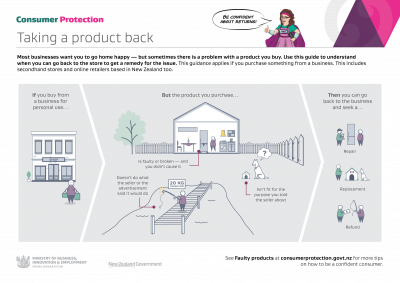If a Company Continues to Send You a Damaged Product Under Warranty What Can I Do
What to do when something doesn't work, breaks easily, is unsafe or doesn't do what you expected it to.
On this page
If a business supplies you a faulty or unsafe consumer product, you can ask for the good or service to be fixed under the Consumer Guarantees Act (CGA). If a product fault is minor and can be fixed, the retailer can choose to repair the item, replace it, or refund your money.
This also applies to new or second-hand products bought through:
- auctions
- websites
- an agent or broker who sells on behalf of someone.
Private sales are not covered by the CGA e.g. buying from a private seller (not traders) on sites like TradeMe.
Private sales and second-hand goods
Your rights
It's good to know your rights on faulty or unsafe products.
Your rights when the manufacturer's warranty has expired(external link) — YouTube
The Consumer Guarantees Act (CGA) covers you for products that don't do what they are meant to or are defective or faulty in some way.
Any products you are supplied should be of acceptable quality. This means the products should:
- be satisfactory in look and finish
- be free from small faults
- last for a reasonable time
- be safe to use
- do everything they are commonly used for.
These factors are used to test whether a reasonable person would think a product is faulty or not, considering:
- who supplied the products, e.g. an established chain vs flea market trader
- age and type of products — second-hand products are more likely to show signs of use and may be less durable
- price — poor-quality products are usually cheaper
- statements made about quality or condition by the salesperson or in advertising
- statements made about compliance with New Zealand or overseas safety standards.
If you are specifically told about any faults when you are supplied the product, you can't claim because of them later.
Take a photo
If an item you've bought arrives damaged, take a photo of the packaging before you open it. It could make it easier to discuss a remedy with the seller.
Ann's story — Exchanging a faulty product
Ann returns a faulty wireless speaker. The retailer offers to replace the product with a newer model that has more features but is more expensive. Ann agrees to the new model and pays the difference in price.

Manufacturer's warranties and extended warranties
If products come with a manufacturer's warranty, or you have paid for an extra extended warranty, your rights under the CGA still apply.
These extra warranties are in addition to CGA protections, so make sure it will offer you more than what you are already entitled to under the law. For example, a manufacturer might offer a 'lifetime warranty' for a product. Under the CGA a product only must last a reasonable time, so this manufacturer's warranty would cover you even after your rights under the CGA have expired.
Warranties
When you can't claim
You can't claim under the Consumer Guarantees Act if:
- you used the product in a way that a reasonable consumer would not
- you used the product so much that it is reasonable that it broke
- you broke or lost the product
- you modified the product, and this is what caused the issue.
Consumer Guarantees Act
![]()
Am I covered?
If your washing machine breaks down a month after the warranty has expired, are you still covered?
Answer
Yes! Because a product should last for a reasonable amount of time so if something breaks down after your warranty has expired, you may still be covered under the Consumer Guarantees Act.
Nicholas' story — Not fit for purpose
Nicholas told a car dealer he needed a car powerful enough to tow his three-tonne boat. When he hooks up his boat trailer at the weekend, he finds the car is not powerful enough. This is a serious breach of the consumer guarantee about goods being fit for a particular purpose. He complains to the dealer — he's entitled to reject the car and ask for his money back.

Product safety
Products sold in New Zealand must be safe to use. Many products are covered by mandatory or voluntary product safety standards. These standards are written to test to a minimum level of quality safety to help prevent injuries or reduce the risk of them happening.
Bicycles, toys, children's nightwear, baby walkers, cots and cigarette lighters are regulated in New Zealand. You should ask the supplier if those products meet minimum safety requirements.
If you have some concerns about the safety of a product or if you're injured by a product, you should tell the retailer or supplier about it straight away.
For more information on your rights, choosing safe products and what to do with unsafe products can be found here:
Product safety(external link)
Some products that you've bought might have been recalled due to quality or safety concerns.
Product recalls
You can keep dangerous products out of your home by signing up for product recall alert emails. You can be alerted to all recalls or select from a list of product categories.
Subscribe to Product Recalls(external link) — Product Recalls
Common problems and what to do
What to do if:
Can't go back to the retailer
If the retailer has gone out of business or you have problems dealing with them, you may want to go to the manufacturer instead:
- If the fault has resulted in the products losing some of their value, you're entitled to ask the manufacturer for a refund of some of the purchase price. But, if they have given you a warranty saying they will repair or replace the products then you have to give them a chance to do that first.
- You can ask them to pay for any extra damage caused by the products (consequential loss), but not if the problem is caused by an event outside of human control, such as an earthquake.
Fault can be fixed and isn't serious
You must give the retailer the opportunity to:
- repair the products within a reasonable time and free of charge
- replace products of an identical type and value within a reasonable time — you only have to pay the difference if you choose a replacement of greater value
- refund the value of the products in full, in the same form as your original payment.
If a product is faulty, the retailer can't simply offer you store credit. They must fix or replace it, or give you a refund. A 'reasonable time' is how long it would take other retailers to fix or replace the products.
If they refuse to fix the problem, take longer than a reasonable time to fix it, or don't fix it at all, you can:
- get the products repaired elsewhere and claim the cost of those repairs from the retailer
- reject the products and claim a refund or replacement products.
All refunds must be paid in cash, or however the products were paid for originally.
Fault is serious
You can legally:
- keep the product and claim compensation for the loss in value
- reject the product and get an identical replacement
- reject the product and ask for a full refund.
If you reject a product because of a serious problem and ask for a refund, you don't have to accept a credit note or an exchange of products instead of cash.
A problem with a product is considered serious if:
- a reasonable consumer would not have bought the product if they had known about the fault
- products are significantly different from their description, sample, or demonstration model
- products are not fit for their normal or specific purpose and can't easily be put right
- the products are unsafe.
Factors that influence whether a fault is serious include:
- If you have only had the products for a short time then the fault is more likely to be serious.
- The more expensive a product is, the more likely it is that the fault may be serious.
- How different the product is to any claims made in the advertising, packaging or made by the seller.
- If there have been any other faults — a series of minor faults might become serious if they add up to a loss of confidence in the reliability of a product.
The retailer must give you enough information to be able to make an informed choice about the remedies. If you choose to reject a product, you must do it in a reasonable time. A reasonable time means soon after the date you became aware of a defect.
It is your responsibility to return the faulty product to the business. If it's expensive or complicated to return the item, the business must arrange for it to be collected, at its expense.
For example, if you've had a wood burner installed and don't have the equipment or skills to remove it, the business must arrange — and pay for — someone to come and get it.
Fault caused extra losses (consequential loss)
If a faulty product has caused damage to your property, you can claim compensation. But there is a limit to what you can claim. The loss must be 'reasonably foreseeable' and you must minimise or avoid any extra loss if possible. Sometimes it is hard to put an amount on the loss you have suffered because the damage has also affected other property. You may need to seek legal advice on this.
A retailer or manufacturer can't opt out of consequential loss so they're not liable, unless the services are being bought for a business purpose.
Bought from a private seller
Private sales are not covered by the Consumer Guarantees Act or the Fair Trading Act.
Private sales means individuals — not someone in trade, or a business — making one-off or occasional sales via:
- websites likeTrade Me or Facebook
- auctions
- classified adverts
- fairs.
Private sales and second-hand goods
Bought from an overseas seller
While your consumer rights might still apply when you buy online from overseas, it can be difficult to enforce them and resolve problems. Check the seller's website for terms and conditions including:
- return, exchange or refund policies
- complaints process
- consumer laws.
If you pay by credit card, you can ask your bank for a chargeback if your products don't arrive. This reverses the charge on your credit or debit card. There is a time limit on getting a chargeback. Ask your bank or credit card company what it is.
Online shopping
Faulty product was bought on credit
Although you should go to the retailer first to get faulty products fixed, let your lender know about the problem too.
If the retailer has gone out of business or refuses to act, you might be able to get a remedy from your lender instead if the retailer arranged the credit contract. In these cases, the lender is also responsible for quality guarantees under the CGA.
Contracts and sales agreements – cancelling a contract
Electrical or gas products
Electrical appliances must be safe even if they are sold second-hand by a private seller. If you buy second-hand, get the product checked out by an expert or qualified person if you can.
All electrical products, new and secondhand, must comply with:
- electrical safety requirements
- product safety standards
- any unsafe goods notices.
Product safety
If you believe there is a safety issue with an electrical or gas product — especially if it is a generic problem — you should also advise Energy Safety.
Contact Energy Safety(external link) — Energy Safety
Digital download or streaming
Digital products include software and internet downloads or streaming, eg music, games, movies and e-books.
The CGA applies to digital products. So, you have the right to a refund, repair or replacement for faulty digital products supplied by New Zealand businesses.
Watch out for:
- illegal (pirated) copies
- faulty downloads
- limited information about the product itself, technical requirements, terms of use and digital rights management (DRM)
- unfair contract terms, e.g. limiting liability if downloading or streaming doesn't work
- limited information on customer helplines and how to complain
- online scams.
Digital products
We have industry-specific guidance, e.g. on electronics and appliances, and cars in our Help by product and service section.
Help by product and service
Act fast
Tell the service provider or retailer about an issue as soon as you find it. If you wait too long you might lose the right to a remedy.
Sabine's story — Compensation for faulty goods
Sabine buys a chest freezer for her garage. A month later she discovers the freezer has broken down. All the food in it has thawed and gone rotten. A repairer confirms there was a fault with the freezer. Sabine goes back to the store and gets a refund. She is also entitled to compensation to cover the cost of the spoiled food.

Taking a product back
Use this guide to understand when it's fair to return a product and ask for a remedy.

Download guide: Taking a product back [PDF, 454 KB]
More help
Get support at any point from:
- Citizens Advice Bureau (CAB) — a free, independent service, run by volunteers. CAB can advise you on your consumer rights and obligations, in person, by phone, or online.
- Community Law Centre — offers free one-on-one legal advice to people with limited finances. The organisation has 24 community law centres throughout the country. You can find legal information and other resources on its website.
Find a CAB(external link) — Citizens Advice Bureau
Our law centres(external link) — Community Law Centres
Take it further
If you can't resolve your issue directly with the business, the Disputes Tribunal or District Court may be your next step. Bear in mind, if the seller is overseas, it may be harder to enforce any formal decision.
What the tribunal can help with(external link) — Disputes Tribunal
If you think the business has misled you about your consumer rights, you can complain to the Commerce Commission. Commerce Commission doesn't act on behalf of individuals and can't investigate every complaint. But their investigations do help make sure businesses are complying with the law. Your information helps them assess which consumer issues are causing greatest harm.
Make a complaint(external link) — Commerce Commission
Examples
Example — Not fit for purpose
Nicholas told a car dealer he needed a car powerful enough to tow his three-tonne boat. When he hooks up his boat trailer at the weekend, he finds the car is not powerful enough. This is a serious breach of the consumer guarantee about goods being fit for a particular purpose. He complains to the dealer — he's entitled to reject the car and ask for his money back.
Example — Exchanging a faulty product
Ann returns a faulty wireless speaker. The retailer offers to replace the product with a newer model that has more features but is more expensive. An agrees to the new model and pays the difference in price.
Example — Compensation for extra loss
Jack's washing machine is faulty and floods his house. He misses a movie he was due to see because he needs to clean up the mess. As well as a remedy for the faulty washing machine, Jack can claim compensation for any damage due to the flooding, eg for water-damaged flooring. But he's not entitled to claim the price of his cinema ticket — it was his decision to stay home and miss the film.
Example — Compensation for faulty goods
Sabine buys a chest freezer for her garage. A month later she discovers the freezer has broken down. All the food in it has thawed and gone rotten. A repairer confirms there was a fault with the freezer. Sabine goes back to the store and gets a refund. She is also entitled to compensation to cover the cost of the spoiled food.
Source: https://www.consumerprotection.govt.nz/general-help/common-consumer-issues/faulty-and-unsafe-products/
0 Response to "If a Company Continues to Send You a Damaged Product Under Warranty What Can I Do"
Post a Comment